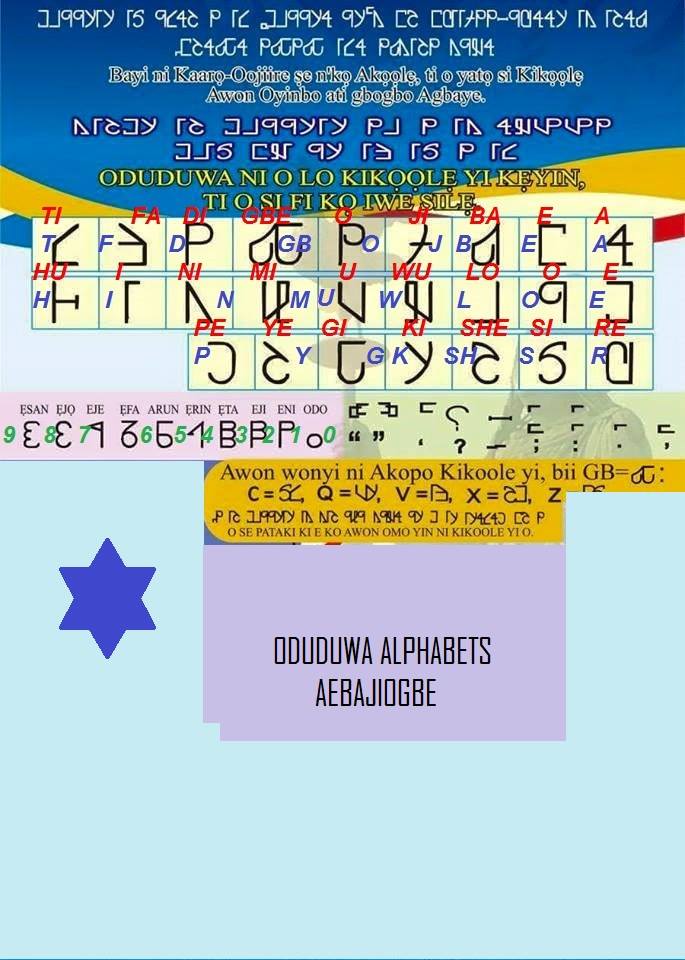The Odùduwà or Àìbájìogbè alphabet is one of more than a dozen scripts (notably from West Africa and South Asia) that were created as the result of a dream, vision, or divine commandment.
Its creator, Chief Tolúlàṣẹ R. Ògúntósìn I. Táyé, was from Iléṣà in present Ọ̀ṣun state of Nigeria. After the death of his father in 1997, he, as the eldest son, had to care for his siblings and couldn’t further his education beyond secondary school.
However, as a Yorùbá chief, he focused his cultural work on uniting the seven grandchildren of Odùduwa, serving as a mediator. As his cultural integration work progressed, however, he wanted to achieve more.
In 2011, he approached a babaláwo or “diviner” of Ifa, the Yorùbá god of wisdom. The diviner, Olókun Awópẹ̀tu, told him to visit his ancestral shrine within the Farasinmi community in Badagry, Lagos State, Nigeria.
There, he found a “strange object” that he took with him back to Porto-Novo, Benin. When he arrived, the house was completely dark. With no light bulbs in the living room, he usually relied on light emitted from the rays of the TV screen. He placed the object on the table and switched on the TV, only to discover, surprisingly, that the object he placed on the table had disappeared. He turned the entire room upside down and finally found it in a corner of the house.
That night, he slept with the object under his pillow. He dreamed he was taken to the sun, where he saw a beam of light reflect in a dark place in the solar system. The beam of light revealed the alphabet, and he kept hearing the phrase “Teach this to the world” in his head.
The dream recurred until 2015, when on his solar voyage he met a man named Lámúrúdu who taught him how to pronounce the alphabet revealed through the beam of light. He kept seeing himself as an old man, going about from one planet to another, teaching people the new alphabet.
One day, he went to the king, Oníkòyí Abẹ̀sán Alájàṣẹ́, in Porto Novo in the Republic of Benin, and told him that in his dreams he had been going about teaching people the “Àìbájìogbè.” The king asked him to write what he saw in the dream, and when he did the king said the vision was an alphabet for the Yorùbá language.
Ògúntósìn proceeded to convert the information from his dream into 25 characters, which he collectively called Odùduwà, Àìbájìogbè, or the “Talking Alphabet,” as the letter names collectively represent the words which mean “If you are using it, you shall be moving forward in every way in life. God shall move you to the next level if you think deeper. God is the only one that has the final say. You shall live long on Earth, to complete your assignment as God sent you to do.”
The name Odùduwà derives from his belief that the alphabet was used back in the 12th century by King Odùduwà, who is regarded as the father of the Yoruba people, but was since lost.
In 2017, more than a dozen regional traditional rulers supported the “domestication, institutionalization, teaching and learning” of the new script, saying the initiative if sustained “will go a long way at reconnecting the Yorubas all over the world” and adding, “It is our collective belief that the learning of these alphabets will give us our true identity, foster unity, distinguish us and reunite us as a nation.”
Since then, however, official promises to teach the alphabet in elementary schools across southwest Nigeria have gone unfulfilled.
Ògúntósìn has continued to promote his script across the Yorùbá-speaking region, writing a book, producing a documentary and using YouTube, WhatsApp and Facebook Groups: “Ẹ̀kọ́ Aèébàèjìogbè Odùduwà” and “Odùduwà Alphabets” to promote and teach interested language learners.
One supporter printed a thousand copies of the “Aèébàèjìogbè Odùduwà Alphabets” exercise book for primary school pupils, and educational pamphlets were printed in Igbo, Hausa, English, and French languages respectively.

7.5629° N, 4.5200° E
BBC News in Yoruba
https://www.bbc.com/yoruba/46873867
Yoruba Renaissance Facebook page
https://www.facebook.com/yorubarenaissance1/